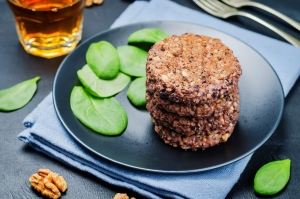Are you striving to live more environmentally responsible and healthier without going broke over your grocery bill? The market is full of healthy meat substitutes, and Glenda’s Farmhouse is proud to play a part by offering nutritious and fresh walnuts, almonds, and more.
Glenda’s Farmhouse and the Environment

Shells of walnuts can be used as biomass fuels, a type of renewable energy.
Our processes are regenerative and include planting cover crops, keeping the soil healthy, and protecting pollinating insects.
A Meatless Diet
Protein will be the most significant concern when replacing meat in your diet. Nuts, legumes, and other foods provide the protein you’re seeking, and you can find various products that are created as a facsimile of meat to satisfy your meat cravings. In place of animal protein, you’ll want to choose other sources.
The healthiest approach to a meatless diet is to focus on unprocessed foods as much as possible. For instance, Glenda’s Farmhouse walnuts, almonds, pecans, hazelnuts, and cashews provide protein without the processing.
Glenda’s Farmhouse even offers our own walnut crumble that substitutes for ground meat in various recipes. They come in three different flavors:
- Glenda’s Farmhouse Savory Walnut Crumbles
- Glenda’s Farmhouse Asian-Inspired Walnut Crumbles
- Glenda’s Farmhouse Mexican-Inspired Walnut Crumbles
Evaluating the Healthiness – for the Body and the Planet – of Various Meat Substitutes
Tofu
In existence for two millennia, tofu is made from the coagulated milk of soybeans. Its nutritional profile is impressive, containing all nine essential amino acids and additional minerals and nutrients. Some caveats do exist, though. Avoid tofu if you have thyroid issues, past kidney stones, or estrogen sensitivity.
Tofu is also beneficial for the environment if humans consume it directly. Too often, though, soybeans are grown for animal feed, exponentially increasing their carbon footprint.
Seitan
Around for nearly as long as tofu, seitan is the brainchild of 6th-century Buddhist monks. Seitan has tons of protein and a tiny amount of carbohydrates and fats; however, the protein content doesn’t include all nine essential amino acids. It’s also processed, so it should be enjoyed as a portion of a varied diet. Being made from wheat, seitan is inappropriate for someone with a gluten allergy.
The environmental impact of seitan is even less than tofu, with a carbon footprint 130 times lower than that of beef.
Vegan Burgers
In the vein of the Impossible Burger and the Beyond Meat brand, the vegan Burger is the face of the meat alternative market. While the vegan Burger provides plenty of protein, it’s also very processed. The processes used to make the burgers are so much like the real thing that they’re high in sodium and saturated fat, so they’re not as healthy as you might imagine.
As for the eco-friendliness of vegan burgers, when compared to beef burgers, they’re much better.
Glenda’s Farmhouse’s founding principles focus on family, health based on nutrition, farming with respect for the land, and appropriate use of technological advancements. Healthy meat substitutes can be good for you, the environment, and your wallet. To learn how we respect our customers and the land, reach out online or call (530) 839-2236.



